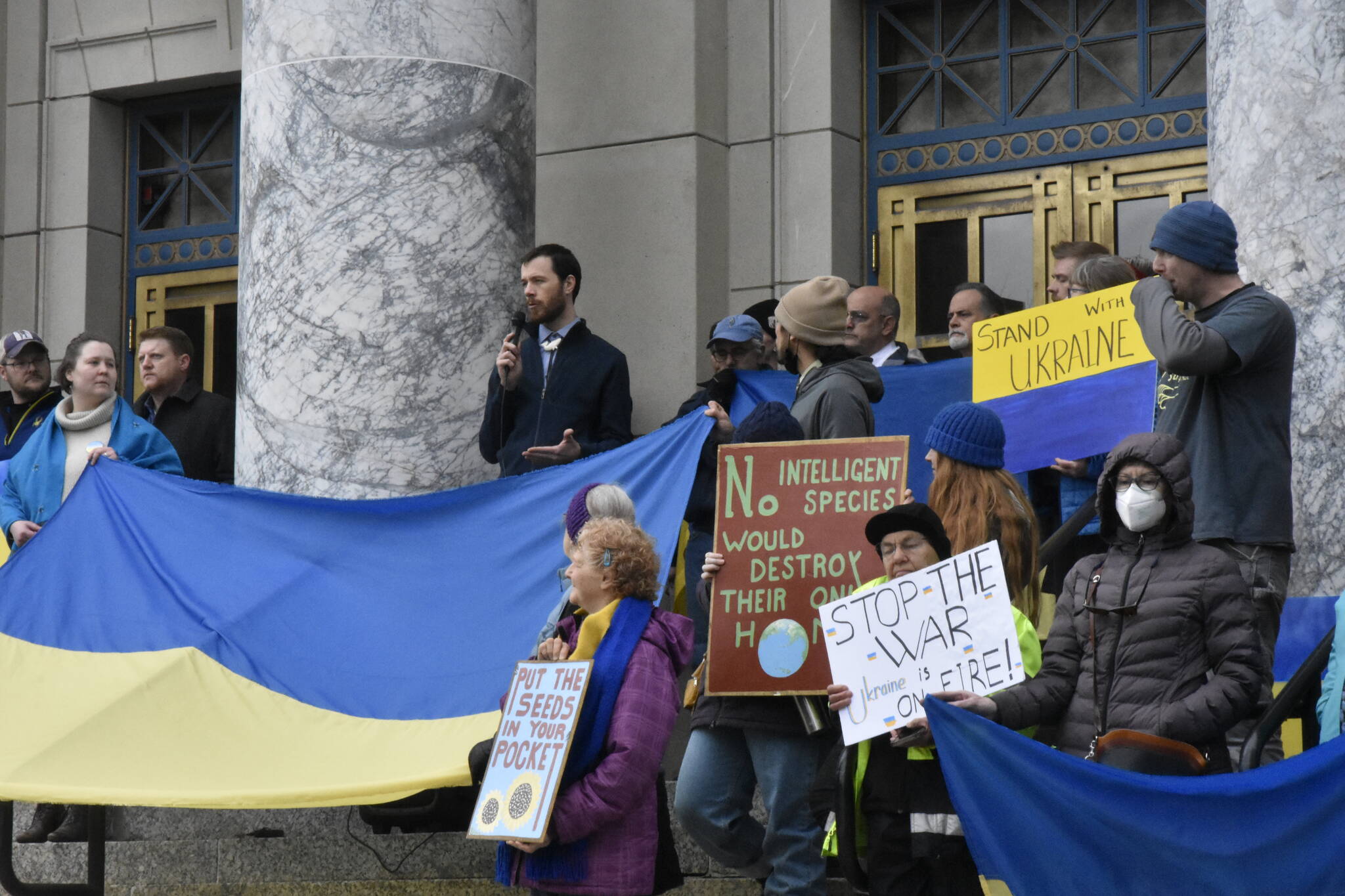A growing chorus of Alaskans is demanding the state sever financial ties with Russia as locals look to show solidarity with Ukraine.
On Friday, a bipartisan rally carried that cry, urging the state to deprive the Russian war machine of the funds it needs to run as sanctions against Russia and some of its oligarchs take effect, hitting the Russian economy hard. Gov. Mike Dunleavy on Thursday ordered the state Department of Revenue to look at its Russian assets and divest where appropriate. Dunleavy asked the Alaska Permanent Fund Corp. Board of Trustees and state-owned corporations to do the same.
“It’s a step,” said Nick Moe, one of the organizers of the rally, where both Democratic and Republican lawmakers spoke of pulling all funds from investment with Russian firms. “The strong statement was bipartisan support for the people of Ukraine.”
Dunleavy issued a statement Thursday saying he instructed state agencies to identify and divest, if and when appropriate, from Russian assets and asked the same of Alaskan businesses and the Alaska Permanent Fund Corporation.
[Sunflowers under a rainy sky: Juneau rallies for Ukraine]
“I don’t know a lot about politics. But I know a lot about being a person. That’s why I’m standing here today,” said Viktor Tkachenko, who recently moved to Alaska from Ukraine. “It’s not just about Ukraine anymore. It’s about the whole world.”
Tkachenko also spoke of the folly of having a pitched artillery duel in the shadow of Europe’s biggest nuclear reactor, and urged NATO to be inspired by the courage of President Volodymyr Zelensky and provide air cover for Ukrainian forces against Russian airpower.
In addition to urging a mass boycott of Russian products, Dunleavy said Alaska cities should end any sister city programs and universities should end all cultural exchange programs with Russia.
“People are asking to divest the $168 million the Permanent Fund Corporation has invested in Russian companies,” said Sen. Bill Wielechowski, D-Anchorage, during the rally. “Those funds are tied to 17 different oligarchs that are on the sanctions list.”
APFC did not respond to request for comment Friday but previously told the Empire it was following the situation closely and assessing the impact on investments.
“I think we’re making progress. That’s good news,” said Rep. Zack Fields, D-Anchorage. “What else can we do?”
APFC said Tuesday it has never divested for political reasons, though citizens and lawmakers submitted several requests to cut ties with various nations or industries. Environmentalists have repeatedly called on APFC to divest from fossil fuels and lawmakers have requested the corporation divest from certain countries.
“We’ve been supporting countries that ignore environmental policies for a long time,” said Senate President Peter Micciche, R-Soldotna during the rally.
But the corporation says it only follows its prudent investor rule, which looks at the monetary benefits of assets over political ones. But those two considerations can and do intersect. Wielechowski said on Monday APFC pushed back against his previous requests to divest from Iran and Sudan, but the corporation did eventually pull its assets as those countries became worse investments.
“You have to do the right thing,” Moe said. “How are people going to feel spending blood money?”
At the national level, Alaska’s congressional delegation joined efforts to bring economic punishments against Russia. Alaska’s U.S. Sens. Lisa Murkowski and Dan Sullivan, both Republicans, were among a bipartisan group of 18 senators to sign onto a bill banning the importation of Russian energy products. The effort was led by Murkowski and Sen. Joe Manchin, D-West Virginia.
U.S. Rep Don Young, R-Alaska, signed onto a similar bill in the U.S. House of Representatives and earlier this week introduced legislation to seize Russian vessels in American waters.
Throughout all lawmakers’ criticism of the Russian invasion was the call for increased energy production in Alaska.
“America purchases more than 700,000 barrels of oil and other petroleum products each day from Russia,” Young said in a statement Friday. “This unfortunate truth means that Vladimir Putin and his cronies are using American families as a piggy bank for an illegal war on Ukraine.”
Sullivan has been vocal in the media about the Biden administration’s environmental policies, and following the State of the Union address drafted a letter calling on the president to fast track energy projects in the U.S. The letter was signed onto by 22 fellow Republican senators including Senate Minority Leader Mitch McConnell, R-Kentucky.
Rep. Andi Story, D-Juneau, and Rep. Ivy Spohnholz, D-Anchorage also spoke during the rally.
• Contact reporter Michael S. Lockett at (757) 621-1197 or mlockett@juneauempire.com.

